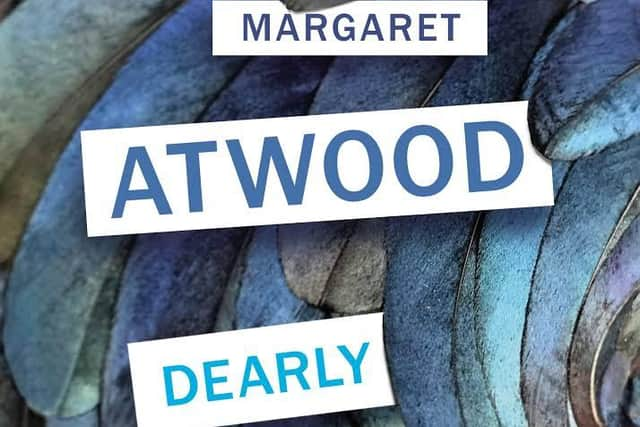Book review: Dearly, by Margaret Atwood


The cover of Margaret Atwood’s new collection of poetry – taken from a recent work by British sculptor Kate MccGwire – features a great swirl of deep blue feathers, touched by tones of light grey and brown; and it’s appropriate not only because of the number of birds that appear in the 57 poems, or sequences of poems, gathered in this book, but because of the soaring quality of the verse itself, which is often dark, but always illuminated by characteristic flashes of brilliance and wit, and powered by a pure force of creative energy that sometimes feels like a mighty wind, lifting us up and shifting the ground beneath us as we read.
Born in Toronto 81 years ago this month, Atwood is one of the world’s most acclaimed writers, a novelist, poet, essayist and short story writer garlanded with awards both in Canada and internationally, over the last five decades. She is now known mainly for her novels, and most notably for her dystopian post-feminist nightmare The Handmaid’s Tale, first published in 1985, which has – since the recent television series based on it – become one of the key feminist texts of the #metoo era.
Advertisement
Hide AdIn her novels as in her poetry, though, there are two interwoven strands in her presence as a writer; the one sharp, committed, knowing, political and polemical, the other profoundly poetic, wedded to the ever-shifting miracle of language itself, and far more mysterious and unpredictable in its preoccupations and outcomes. This collection therefore features two cycles of poetry on the upfront themes of male violence against women – in a sequence titled Songs For Murdered Sisters – and human destruction of the natural environment, in what Atwood dubs the “Plasticene” era; her nine-poem cycle The Plasticene Suite reflects the intrusion of plastics everywhere in the natural world, from the branches of trees to the stomachs of dead baby whales. In both cycles, and particularly in Songs For Murdered Sisters, Atwood’s poetry is vibrant with purpose, brilliant, hard-edged, and instantly legible; and they will doubtless become classics of our troubled time, quoted in polemics and taught in schools.


Yet powerful though these poems are, there is often an even stronger shiver of greatness in the poems that take us by surprise, moving swiftly from a simple observation or memory – of a long-ago school lesson, a drawer full of old passports, a bird dead after flying into window glass – towards a profound and stunning recognition both of the crisis of uncontrollable change humanity now faces, and of the inexorable power of ageing and mortality. Her approaches to these themes range from nostalgia for what now seems like a gilded and hopelessly innocent postwar youth, through brilliant poems about dementia as suffered both by her late lifelong partner and – in one searingly brilliant poem – her ageing cat, to laments for lost fragments of language itself, as in the book’s title poem, built around the fading word “dearly.”
Atwood’s themes are sombre, in other words; perhaps as sombre as they come. Yet this whole collection stands as a mighty demonstration of how great poetry can embody and celebrate the sheer vibrancy and beauty of life, in the face of the most profound sorrow and terror. Read these poems aloud, read them carefully, read them with joy and tears; savour the raw power of their rhythms and assonances, and the sheer mastery with which Atwood, at the height of her powers, transforms anger and grief into glinting beauty and brilliance. And then ask yourself whether, if humanity survives, any future historian could ever find a richer, more courageous or more truthful account of what it was, and how it felt, to be alive in these times; and give yourself the answer – no, most truly, she could not.
Dearly by Margaret Atwood, Chatto & Windus, £14.99
A message from the Editor:
Thank you for reading this story on our website. While I have your attention, I also have an important request to make of you.
The dramatic events of 2020 are having a major impact on many of our advertisers - and consequently the revenue we receive. We are now more reliant than ever on you taking out a digital subscription to support our journalism.
To subscribe to scotsman.com and enjoy unlimited access to Scottish news and information online and on our app, visit https://www.scotsman.com/subscriptions
Joy Yates, Editorial Director